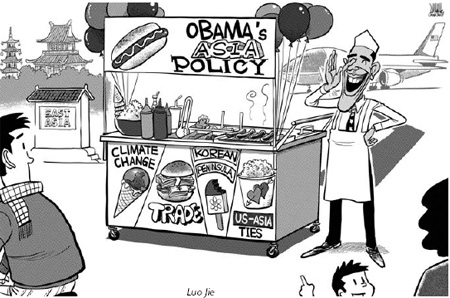-
-
China Daily E-paper
Yang Yi
Clear communication needed
By Yang Yi (China Daily)
Updated: 2009-11-16 07:37
US President Barack Obama's state visit to China, which started yesterday, will play a positive role in propelling forward the comprehensive development of bilateral ties.
Sino-US relations have generally remained stable over the past years with fruitful cooperation on a range of issues. However, bilateral ties have been uneven, with substantial progress achieved in the political and economic domain while much remains to be done on the security and military fronts.
| ||||
A benign interaction between the two countries in the military realm will contribute much to a steady and forward-looking bilateral relationship. China's military modernization has been acomuccelerated in tandem with its fast-paced economic development in the past decades, which has caused concern within the world's sole superpower. How Washington looks upon Beijing's military modernization campaign and what strategy it will adopt toward the emerging nation will have a major bearing on bilateral ties.
At the same time, how China will make use of its ever-growing influence and strengthened military strength is also expected to impact the strategy and policy that the rest of the world, the US in particular, will adopt toward it.
The US should accept China's anticipated status as a military power in the future and try to discard its long-harbored precept that another potential military power should be subdued in advance. It should also realize China's military modernization is inevitable and that blockades, sanctions or containment would only further worsen military ties with the country. For China's part, it should continue to adhere to its long-cherished defensive military strategy and closely follow its commitment that the country's sharpened military edges will not be used to seek regional and global hegemony.
As China's military might grows, and especially, its naval and air forces expand their range of activities, Chinese and American military activities and missions are expected to increase in open sea and air spaces. In view of this, the two countries should strictly abide by international maritime and air regulations and try to avoid dangerous military moves that could possibly trigger accidents.
For the time being, the US should first halt frequent short-distance surveillance by its warships and military airplanes of China's coastal areas, a potential fuse for military accidents.
According to the UN Convention on the Law of the Sea, foreign military ships and airplanes can exercise the right of innocent passage through another country's exclusive economic zones, but it should be under compliance with the country's interests and laws. In peacetime, surveillance activities by a country's military ships and airplanes targeting another country can by no means be interpreted as a goodwill gesture.
Maintaining clear lines of communication and enhancing mutual understanding and trust will help prevent accidents. China and the US have engaged in dialogue dozens of times, the topics ranging from a hotline between the two heads of state to consultation mechanisms between relevant administrative agencies. The two defense departments have also set up a hotline, together with consultations on regular and irregular defense affairs and maritime security.
The establishment of regular dialogue mechanisms during peacetime, although very important, cannot replace a communication mechanism at a time of crisis. As two influential powers that share great responsibilities for regional and world peace and stability, China and the US should realize the importance of putting in place a kind of clear communication mechanism at all times.
The two countries should also increase mutual military transparency. In recent years, the US-led Western countries have not stopped pressing for increased military transparency from China. In recent years, Beijing has made great progress in a positive response to Washington's demand that China should increase transparency on its concrete military plans and strategic intentions, even though such demands lack moral weight. For example, China has regularly published the White Paper on National Defense and opened its new military facilities to foreign military personnel.
China's defensive and strategic intentions have been crystal clear given that it is the first country to announce it would not first use nuclear weapons and would not use or threaten to use nuclear weapons against a nuclear-free country. The country is always committed to a peaceful development path and will not pursue an expansive path like the historic big powers. The country has reaffirmed time and again that it would not pursue hegemony even if it becomes more powerful.
The author is a senior naval expert at the Institute of Strategic Studies of the National Defense University.

(China Daily 11/16/2009 page4)












